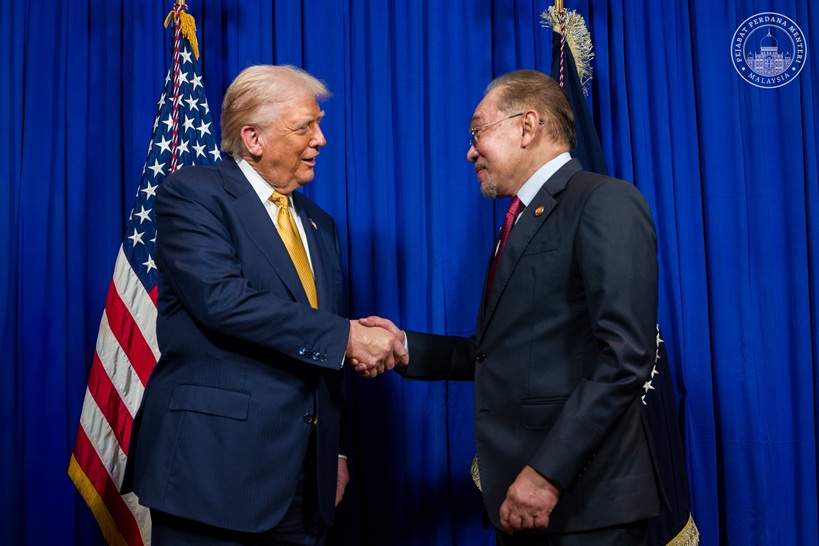
By Dr Rahim Said
When Prime Minister Datuk Seri Anwar Ibrahim shook hands with U.S. President Donald Trump at the 47th ASEAN Summit, both men smiled like they had reinvented free trade. The newly signed Agreement on Reciprocal Trade between Malaysia and the United States sounds balanced on paper — until you read the fine print.
The price of “reciprocity”
Under the deal, the U.S. keeps a 19% tariff rate for Malaysia while our markets open wide to American goods — chemicals, metals, machinery, vehicles, poultry, dairy, and even pork.
Washington’s negotiators must be grinning: Malaysia also commits to buying 30 U.S. aircraft (plus 30 more on option), five million tonnes of LNG yearly, and US$150 billion worth of semiconductors, aerospace parts, and data-centre equipment. Add US$70 billion in capital investments and US$204 million in coal and telecom purchases, and the term “reciprocal” begins to sound like a punchline.
Yes, Malaysia may gain some access to U.S. markets, but this looks more like a one-way shopping spree than a fair exchange. America secures lucrative export contracts; Malaysia inherits a long list of promises.
Rare earths, rare independence
Most strikingly, Malaysia pledges not to restrict exports of critical minerals or rare earths to the U.S., instead promising to “expedite development” with American companies. That’s a generous gesture — just weeks after Beijing announced restrictions on rare-earth exports and retaliatory port fees for U.S.-flagged vessels.
In doing so, Malaysia has effectively handed Washington a strategic supply-chain advantage while signalling to China that our “neutral” stance may be shifting. When the world’s two largest economies weaponise trade, being anyone’s dependable supplier of rare earths is not just business — it’s geopolitics.
Digital strings attached
The agreement goes beyond trade. Malaysia has committed not to impose digital service taxes that “discriminate” against U.S. tech firms, to allow cross-border data transfers, and even to remove broadcast restrictions on U.S. programming.
This might attract investors, but it also nudges our regulatory framework closer to American preferences. The U.S. is exporting not just goods — but governance. Our halal certifications, import procedures, and digital-trade policies will now “streamline” in ways that fit Washington’s comfort zone more than ours.
What about China?
Here’s the delicate part. China remains Malaysia’s largest trading partner, accounting for almost a fifth of total trade. Billions have flowed through Belt and Road projects, while the RCEP trade pact anchors Malaysia firmly in Asia’s supply chain.
Now, with Malaysia signing a sweeping deal that clearly favours U.S. exports and guarantees American access to our minerals, Beijing will be watching closely. The reaction won’t be overt, but could be quietly effective: slower approvals for Malaysian exports, reduced project financing, or less favourable trade terms.
For a country that prides itself on “equidistance,” this deal risks tipping the balance.
The fairness test
If fairness means exposure to U.S. technology and investment, perhaps Malaysia wins. But if it means proportional benefit, the math doesn’t add up. Malaysia’s obligations are concrete — purchase commitments, regulatory concessions, and policy alignments — while the U.S. promises are broad and conditional.
This isn’t a partnership of equals; it’s an arrangement of convenience. Washington secures market share and minerals; Kuala Lumpur gets a handshake and a headline.
Read the fine print — twice
Anwar’s team will frame the deal as diversification, not dependence. Yet bridges between superpowers are often trampled when the elephants start to fight.
Malaysia must ensure this deal delivers genuine industrial benefit — not just expensive symbolism. And when Beijing eventually asks why our rare-earth exports flow freely to America, Putrajaya had better have an answer that sounds like strategy, not surrender.
Because in trade, as in diplomacy, “reciprocal” only counts when both sides walk away equally satisfied. For now, it feels like Malaysia just paid for the music — and Washington gets to dance.
The views expressed here are entirely those of the author
WE